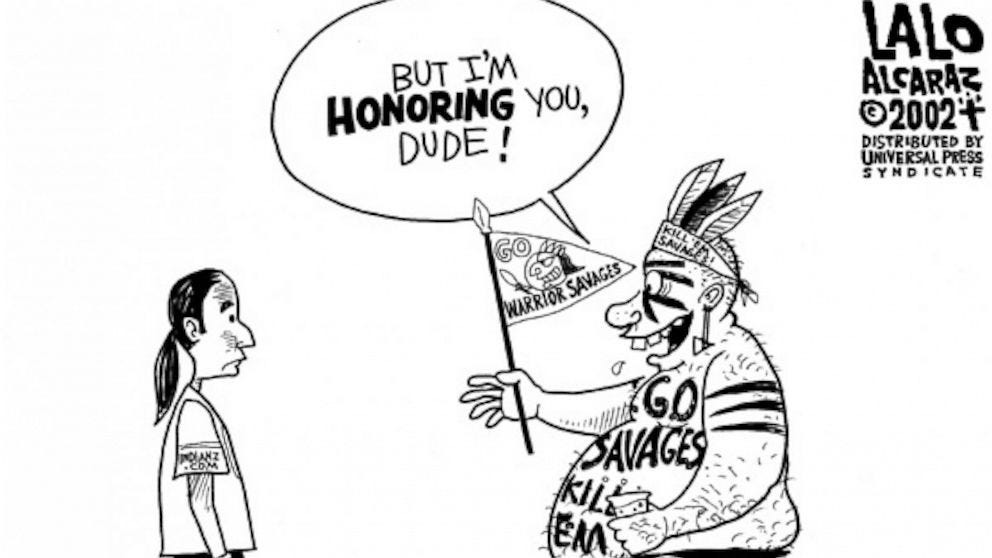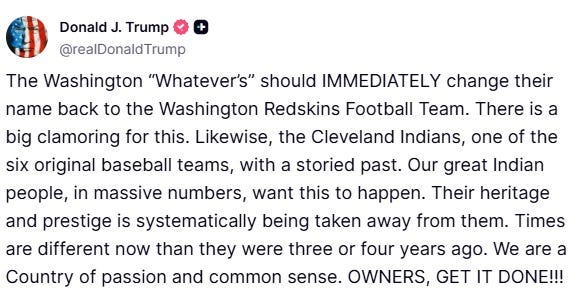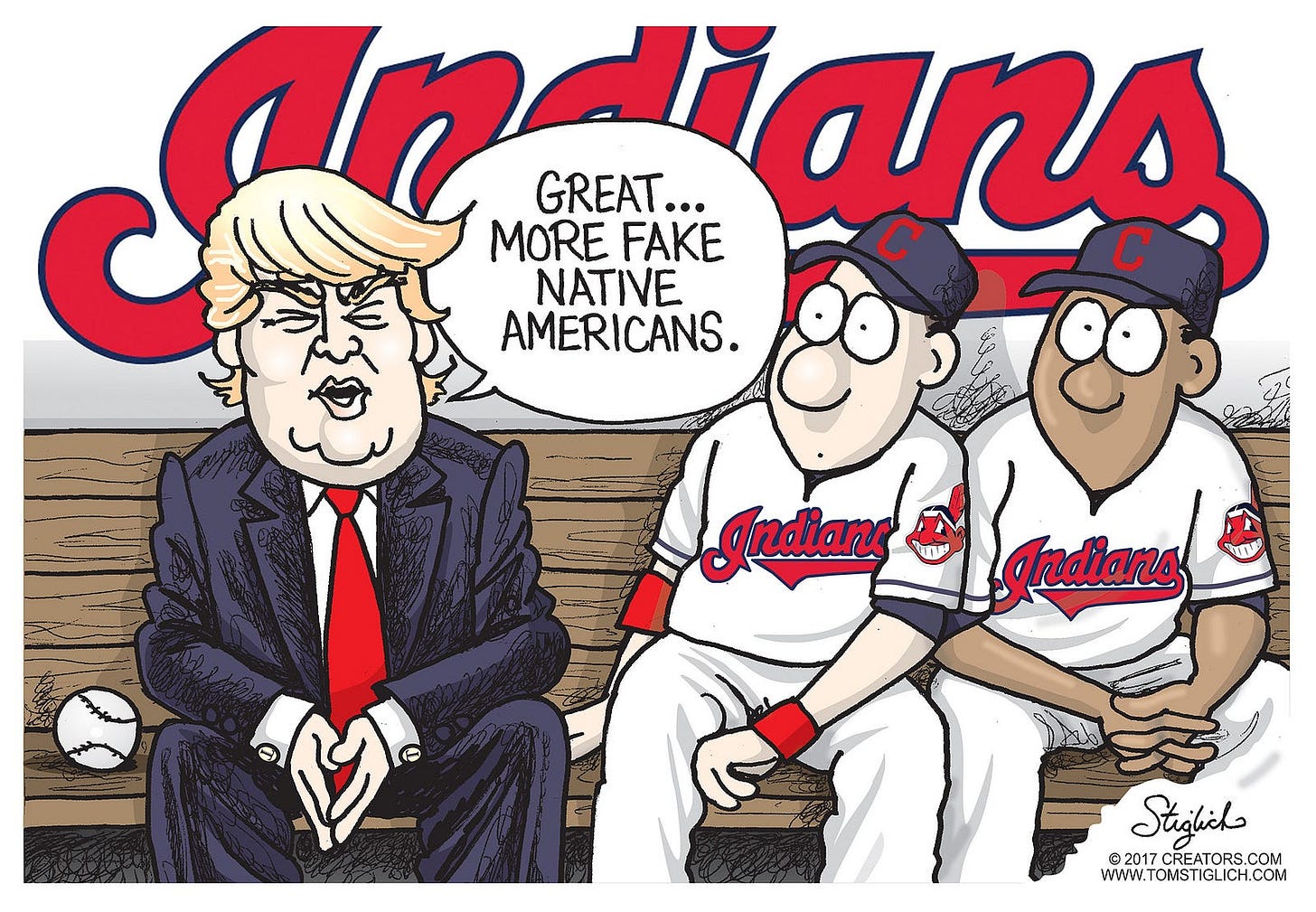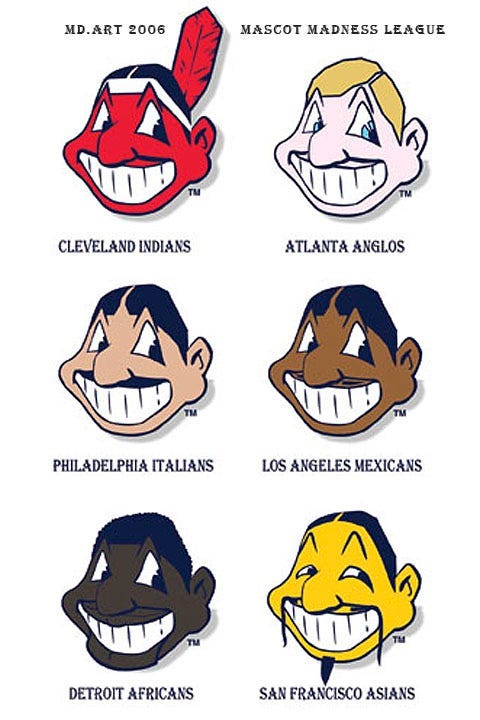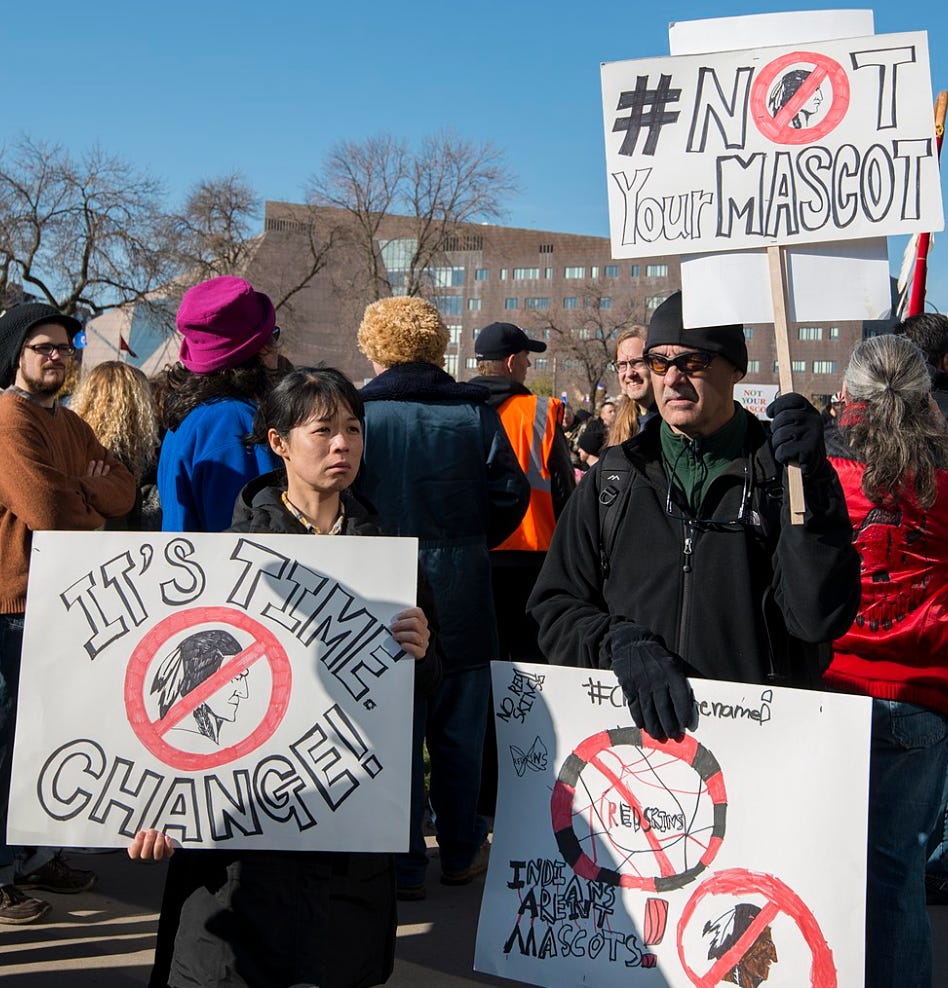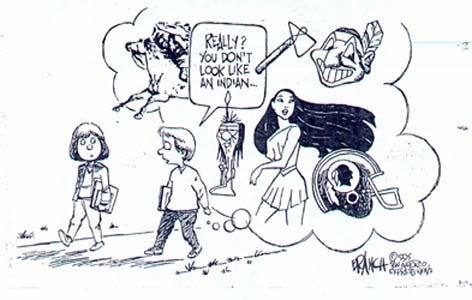"Turning Back Time": Racism In Reverse
This article challenges the statements made by the president regarding the reinstatement of Native images/icons used as mascot.
When the news broke on Sunday, July 20, I thought it might be a marketing ploy or a joke from the current administration. There have been enough controversial matters coming from the present executive to elicit the thought that this statement was a farce. The absence of the presence in the media didn’t help to change this thought. It was with further research in Native news sources that I concluded this was not a joke, but a reality pointing directly from the current socio-political landscape in these United States.
The point, the president is calling for two sports teams to remove their current branding and return to the use of racist stereotypes of Native People. In doing so, the Washington Commanders would revert to being the “Washington Red s*ins” and the Cleveland Guardians would return to being the “Cleveland Indians.”
Such a calling, with political and economic pressure, is unprecedented. How can a sitting president in the United States make such a rash statement and qualify it with the intent to withhold funding? This articulates the tripartite of American socio-political ideology, economic dominance, and colonial discourse.
The Administration’s Point
TRUMP TURNS TO CULTURE WARS
“Over the weekend, Trump made waves in the sports world by calling for the Washington Commanders and Cleveland Guardians to change their names back to the Redskins and Indians, respectively.
“Our great Indian people, in massive numbers, want this to happen,” Trump posted on social media. “Their heritage and prestige is systematically being taken away from them. Times are different now than they were three or four years ago. We are a Country of passion and common sense. OWNERS, GET IT DONE!!!”
Trump Threatens to Block Commanders’ Stadium Over ‘Redskins’ Name, Consequence of Culture, posted July 22.
“Both teams changed their names early in President Biden’s first term over concerns their team names were offensive to Native Americans” (The Hill, July 21).
The Administration’s Argument
“[T]he current nickname 'just doesn’t have the same ring' as ‘Redskins,’” said the president on a series of posts on Truth Social starting early in July (The Sporting News, July 21).
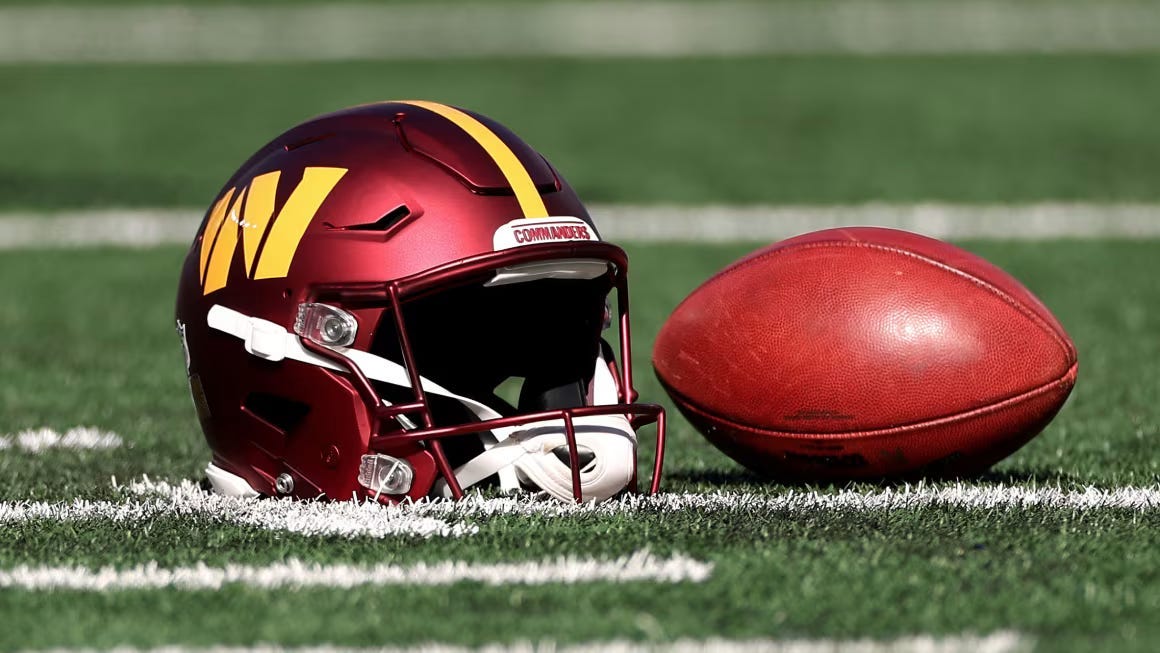
“The Washington ‘Whatever’s’ should IMMEDIATELY change their name back to the Washington Redskins Football Team,” the president wrote Sunday morning. He continued, saying, “Times are different now than they were three or four years ago. We are a Country of passion and common sense. OWNERS, GET IT DONE!!!!” (qtd in The Sporting News, July 21).
“Trump’s Sunday comments went further than ones he made earlier this month, when he told reporters the Commanders’ name should be changed back to the Redskins, something he acknowledged was a ‘controversial statement.’
“It doesn’t have the same ring to me,” he said. “But, you know, winning can make everything sound good. So, if they win, all of a sudden, the Commanders sounds good, but I wouldn’t have changed it” (qtd in CNN, July 21).
The premise returns to winning. Replace this statement with colonialism and the structure is founded: socio-political ideological racism, economic dominance, and colonial disocurse. Turning the argument away from this tripartate and repositioning it as one to favor Indians gives security to the millions of readers in the public sphere who will believe this line of thinking.
The wide-angle view of the public is to have a sporting team in their local area. The use of a racist, slanderous warrior icon/image promotes dominance. Anything less is not as economically viable, as noted by the president. Framing the argument in this manner positions those in the franchise opposed to the naming reversal as adversaries, and those in favor as the winners. There is an internal struggle for territory and economic prominence encapsulated in a new Western frontier of the sporting arena.
Trump Threatens to Derail New Stadium Over Team Name
“President Trump is threatening to derail a plan to build a new stadium in Washington, D.C., for the Washington Commanders football team unless the team changes its name back to the previous name,” NPR reports (qtd in The Political Wire, July 21).
The threat from the president is based on an agreement between Washington and the sports franchise to build a new stadium on the site of the existing RFK Stadium, the team's home from 1961 to 1996. The cost is estimated at $3.7 billion.
Said Trump: “The Washington ‘Whatever’s’ should immediately change their name back to the Washington Redskins Football Team. There is a big clamoring for this” (qtd in The Political Wire, July 21).
The Truth Social post from the president outlines the commitment to upholding a barrier against this deal unless the franchise returns to its pre-2020 branding name change. Seeing the scope of responses and views on Truth Social, the president went further, qualifying his argument as being supportive of “Indian” tribes.
“Donald J. Trump Truth Social 07.20.25 03:35 PM EST My statement on the Washington Redskins has totally blown up, but only in a very positive way. I may put a restriction on them that if they don’t change the name back to the original “Washington Redskins,” and get rid of the ridiculous moniker, “Washington Commanders,” I won’t make a deal for them to build a Stadium in Washington. The Team would be much more valuable, and the Deal would be more exciting for everyone. Cleveland should do the same with the Cleveland Indians. The Owner of the Cleveland Baseball Team, Matt Dolan, who is very political, has lost three Elections in a row because of that ridiculous name change. What he doesn’t understand is that if he changed the name back to the Cleveland Indians, he might actually win an Election. Indians are being treated very unfairly. MAKE INDIANS GREAT AGAIN (MIGA)!” 1:16 PM · Jul 20, 2025, 565.8K (qtd in The Sporting News, July 21).
The president throws a carrot to the team owner, Matt Dolan, by way of suggestion that by changing the name back, he would gain votes to win in an election is ludicrous. If there were complications when the images/icons were used, what evidence is there that reinstating the images/icons will bring a different outcome?
The Point To Follow Suit
New York Times: “In his posts, Mr. Trump also urged the Cleveland Guardians baseball team, which changed its name from the Cleveland Indians in 2021, to follow suit.” (The Political Wire, July 20).
“The Cleveland Guardians said they had no further comment” (qtd in CNN, July 21).
This franchise is facing similar pressure from the president. Without any economic leverage as their contemporary, the Washington Commanders, there is less attention given to this organization. However, the now-retired emblem is a firm signifier of the institutionalized racism against Native People.
This image is a caption that became popular in American culture after WWII. The distortion of physical features is transferred across multiple ethic groups to outline a position of dominance from an American perspective. The “Atlanta Anglo” is a derogatory classist image. The caricature is to be an unintelligent, socio-economically oppressed community representative. Articulated in the company with ethnic groups, all retaining the same gross feature distortion, identifies the depth of bias entertained in American pop culture.
“The Cleveland baseball team announced its name change in 2021, after similar criticism from Native Americans over the “Indians” moniker” (CNN, July 21).
The Cleveland Indians' image/icon remained aside from the others. The fantastical, distorted image/icon became the signifier of racial discrimination against Native People in the U.S. To argue for this overly racialized image/icon to be restored and used as a supporting marker of Native People is itself an open illustration of ignorance with social and ethical relationships. Tribes fought for decades to have this image/icon permanently retired. The abundance of political pressure and unwavering persistence of tribal organizations arguing against the Cleveland image/icon eventually led to the successful abandonment of the caricature. Years later, for a sitting president to call, with force, to have this publicly understood racist image/icon to be recuperated communicates the depth and breadth of negativity from the executive toward tribal entities.
The CounterPoint
Washington NFL Team Changes Back to Its Racist Name
“President Donald Trump took to social media on Sunday, threatening to block a new stadium deal for Washington’s NFL team unless it reverts to its former name, the Redsk!ns — a term widely considered offensive to Native Americans” (Native News Online, July 21).
The National Congress of the American Indian (NCAI) has a firm position on mascotting. On the NCAI website, the organization notes,
NCAI’s Longstanding Opposition to Harmful Native “Themed” Sports Mascots
“As the nation’s oldest, largest, and most representative American Indian and Alaska Native advocacy organization, NCAI has long held a clear position against derogatory and harmful stereotypes of Native people — including sports mascots — in media and popular culture. Since NCAI launched its campaign to address stereotypes of Native people in popular culture, media, and sports in 1968, significant progress has been made in the pursuit of ending the era of unsanctioned Native “themed” mascots.
“NCAI’s position is clear, longstanding, and deeply rooted in our 78 years as a leading voice for Indian Country — we advocate for and protect the civil rights, social justice, and racial equity of all Native people in all parts of American society” (NCAI, Proud To Be, n.d.).
NCAI Ending “Indian” Mascots Initiative: Health Impacts of Native “Themed” Mascots, NCAI, posted April 2022.
This report is an update from the decades of data gathering, research, and community understanding of the tragedies mascots present to Native People. The psychological impact is the strongest argument. Repeated racialized images and their accompanying stereotyped gestures minimise Native students and communities, where they see themselves in a negative, false perspective. From this defeated perspective, Native individuals affected are more likely to turn to alternative methods to disengage with reality, and participate in harmful ways to comfort a negative self-image.
“[T]he reality is that NCAI’s work in this area has been ongoing for decades, intending to eradicate racist stereotypes and promote a true and accurate representation of American Indian and Alaska Native people” (The Sentinel, August 2023).
The longer the exposure to such psychologically disturbing images/icons and manipulative methods to self-medicate away from these lived experiences, the more devastating the outcome for the individual, family, and community. Based on these facts, mascotting has been attached to PTSD in Native individuals and considered a silent epidemic in tribal communities. For an administration to call for these images/icons to resume, knowing — or at least having access to — the data supporting the necessity to eliminate these images/icons is a firm racialized slap in the face of tribal communities.
“The term “Redsk!ns” is widely regarded by Native Americans as a racial slur, comparable in offensiveness to the “N-word” used against African Americans. Native American leaders argue that mascots based on Native themes do not honor their heritage — instead, they believe such imagery dehumanizes and perpetuates harmful stereotypes about their communities.The basis for this opposition goes beyond the racist nature of mascots, according to the Reclaiming Native Truth report, released in June 2018" (Native News Online, July 21).
“Isn’t it time to stop perpetuating the stereotype and give both children and adults the true picture of Indian Culture and history?” (NCAI Executive Director John Belindo (Kiowa Tribe, Navajo Nation), 1968, 2023).
In response to the name change for the Washington Commanders, “[i]n August 2024, franchise owner Josh Harris said, ‘I just think that we’ve been very clear, for obvious reasons the old name can’t come back’” (qtd in The Sporting News, July 21).
“NCAI leaders realized they [are] fighting an uphill battle in a profit-driven industry where success…often ruled out ethical considerations. Something had to change, and that something was public opinion. But NCAI leaders pondered: How could NCAI fight centuries of prejudice and racism entrenched in the minds of Americans and wrestle back ownership of the Indian image from non-Natives who designed and controlled a false portrayal of American Indian and Alaska Native peoples for their own benefit? Educating the public was the answer. NCAI soon turned its attention to placing a greater emphasis on information and awareness, and then expanded their platform to political advocacy on a larger, national scale” (qtd in the Sentinel, August 2023).
Points And Arguments: There Is No Middle Ground
“The president has been clear with his intent to withhold funding for the development sought for the Washington franchise, unless there is a complete reversal of the branding name. The president argues that in the past there was a need for such a name change, but “times are different now’” (qtd in CNN, July 21).
Recall the statements made by the president:
“Our great Indian people, in massive numbers, want this to happen. Their heritage and prestige is systematically being taken away from them,” Trump said. “Times are different now than they were three or four years ago. We are a Country of passion and common sense. OWNERS, GET IT DONE!!!” (qtd in CNN, July 21).
“On Sunday, Trump also called on Cleveland’s Major League Baseball team to return to its former name, the Indians, claiming there is “a big clamoring for this” as well. Both franchises — now known as the Washington Commanders and Cleveland Guardians — adopted their current names ahead of the 2022 season and have stated they have no plans to reverse the changes” (Native News Online, July 21).
This is a misinterpretation of the mascot issue for Native People. The president argues that to respect Native People, the mascots from these two franchises need to remain. Nothing can be farther from the truth. The evidence stated by Native sources contextualizes the traumatic devastation to Native individuals. There is no middle ground.
At these times, communities are different, tribal identities are different, and the health and well-being are different, despite the racist persistence of mascots. To reinstate either or both of these Indian images/icons is to show dominance over culture. The psychological impact that it will have on the larger non-Native community prompts a non-verbal understanding that Native People are trapped in time and can be controlled and manipulated. At the same time, the psychological impact on Native individuals and communities is a slanderous, derogatory statement that even though Native People are still present, they don’t matter.
Alan Lechusza Aquallo


